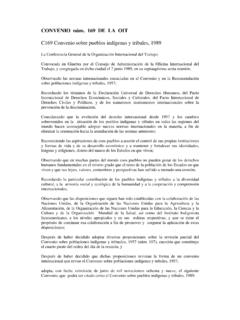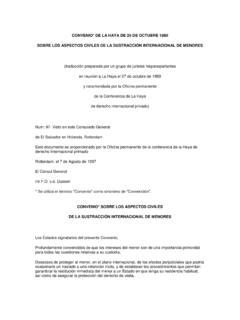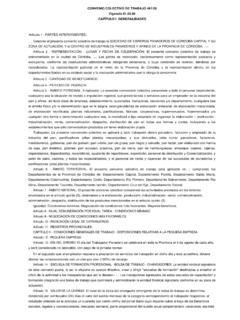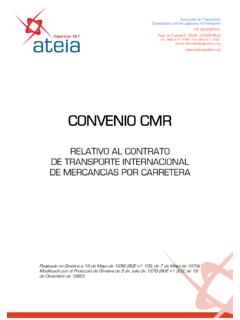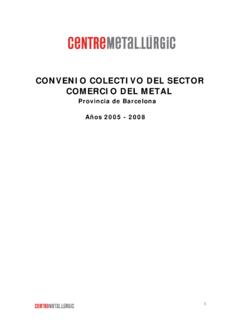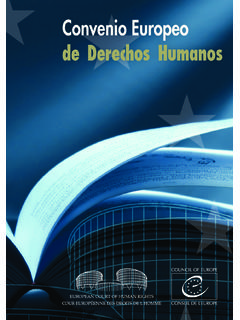Transcription of INCOME TAX CONVENTION WITH SPAIN, WITH …
1 INCOME TAX CONVENTION WITH SPAIN, WITH PROTOCOLGENERAL EFFECTIVE DATE UNDER ARTICLE 29: 1 JANUARY 1991 TABLE OF ARTICLESA rticle 1----------------------------------Gener al ScopeArticle 2----------------------------------Taxes CoveredArticle 3----------------------------------Gener al DefinitionsArticle 4----------------------------------Resid enceArticle 5----------------------------------Perma nent EstablishmentArticle 6----------------------------------Incom e from Real Property (Immovable Property)Article 7----------------------------------Busin ess ProfitsArticle 8----------------------------------Shipp ing and Air TransportArticle 9----------------------------------Assoc iated EnterprisesArticle 10--------------------------------Divide ndsArticle 11--------------------------------Intere stArticle 12--------------------------------Royalt iesArticle 13--------------------------------Capita l GainsArticle 14--------------------------------Branch TaxArticle 15--------------------------------Indepe ndent Personal ServicesArticle 16--------------------------------Depend ent Personal ServicesArticle 17--------------------------------Limita tion on BenefitsArticle 18--------------------------------Direct ors' FeesArticle 19--------------------------------Artist es and AthletesArticle
2 20--------------------------------Pensio ns, Annuities, Alimony, and Child SupportArticle 21--------------------------------Govern ment ServiceArticle 22--------------------------------Studen ts and TraineesArticle 23--------------------------------Other IncomeArticle 24--------------------------------Relief from Double TaxationArticle 25--------------------------------Non-Di scriminationArticle 26--------------------------------Mutual Agreement ProcedureArticle 27--------------------------------Exchan ge of Information and Administrative AssistanceArticle 28--------------------------------Diplom atic Agents and Consular OfficersArticle 29--------------------------------Entry into ForceArticle 30--------------------------------Termin ationProtocol--------------------------- -------of 22 February, 1990 Letter of Submittal---------------------of 21 March, 1990 Letter of Transmittal-------------------of 18 April, 1990 The Saving Clause -------------------Paragraph 3 of Article 1 MESSAGEFROMTHE PRESIDENT OF THE UNITED STATESTRANSMITTINGTHE CONVENTION BETWEEN THE UNITED STATES OF AMERICAAND THE KINGDOM OF SPAIN FOR THE AVOIDANCE OFDOUBLE TAXATION AND THE PREVENTION OF FISCAL EVASIONWITH RESPECT TO TAXES ON INCOME , TOGETHER WITH A RELATED PROTOCOL,SIGNED AT MADRID ON FEBRUARY 22, 1990 LETTER OF SUBMITTALDEPARTMENT OF STATE,Washington, March 21, PRESIDENT,The White House.
3 THE PRESIDENT. I have the honor to submit to you, with a view to its transmission to the Senatefor advice and consent to ratification, the CONVENTION between the United States of America and theKingdom of Spain for the Avoidance of Double Taxation and the Prevention of Fiscal Evasion withrespect to Taxes on INCOME , together with a related Protocol, signed at Madrid on February 22, 1990. The CONVENTION is the first INCOME tax treaty to be negotiated between the United States and is based on the model INCOME tax conventions published by the Organization for EconomicCooperation and Development in 1977 and by the United States Department of the Treasury in in United States INCOME tax law resulting from the enactment of the Tax Reform Act of 1986are reflected in the CONVENTION . The CONVENTION provides for reduced taxation at source of investment INCOME derived from oneState by residents of the other State.
4 The rate of tax withheld at source on dividends may not exceed 15percent and is reduced to 10 percent in the case of dividends from 25 percent-owned subsidiaries totheir parent corporations. The maximum tax on interest, royalties, and branch profits is 10 percent. Inthe case of interest, the general 10 percent limit is reduced to zero on interest derived by either Stateand on interest paid on long-term bank loans or on commercial credit for the importation of capitalequipment. The tax on excess interest of bank branches is 5 percent. In the case of royalties, lowerrates of 5 percent or 8 percent apply in certain cases, 5 percent on royalties for literary or artisticcopyrights, and 8 percent on royalties for scientific copyrights, film rentals, and rentals of on the sale of shares in a company which is a resident of one State may be taxed by that State incertain cases where the recipientowns at least 25 percent of the company's capital or where the shares are represented by real propertyholdings; in other cases gain on the sale of corporate securities may be taxed only in the recipient'scountry of residence.
5 In addition, the CONVENTION provides rules for the taxation at source of business profits andemployment INCOME which are similar to those in the models and in other United States INCOME taxconventions. Special tax relief at source, based on similar provisions in some other United States incometax conventions, is provided for visiting students, researchers, and trainees. The CONVENTION alsocontains a provision limiting its benefits to persons properly entitled to receive them and excluding, forexample, certain enterprises in either State owned by residents of third countries. Such provisions havebeen included in all recent United States tax treaties. A technical memorandum explaining in detail the provisions of the CONVENTION and Protocol is beingprepared by the Department of the Treasury and will be submitted separately to the Senate Committeeon Foreign Relations.
6 The Department of the Treasury, with the cooperation of the Department of State, was primarilyresponsible for the negotiation of the CONVENTION and Protocol. They have the full approval of bothDepartments. Respectfully submitted,LAWRENCE S. OF TRANSMITTALTHE WHITE HOUSE, April 18, the Senate of the United States: I transmit herewith for Senate advice and consent to ratification the CONVENTION between the UnitedStates of America and the kingdom of Spain for the Avoidance of Double Taxation and the Preventionof Fiscal Evasion with respect to Taxes on INCOME , together with a related Protocol, signed at Madridon February 22, 1990. I also transmit the report of the Department of State. The CONVENTION is the first INCOME tax treaty to be negotiated between the United States and in large part on model INCOME tax treaties developed by the Department of the Treasury and theOrganization for Economic Cooperation and Development, it also reflects changes in tax law resultingfrom the enactment of the Tax Reform Act of 1986.
7 The CONVENTION provides rules governing the taxation by each State of INCOME derived by residentsof the other State. The CONVENTION also contains provisions that prevent "treaty shopping" and authorizethe exchange of information and administrative cooperation between the tax authorities of the twoStates. I recommend that the Senate give early and favorable consideration to the CONVENTION and protocoland give its advice and consent to BETWEEN THE UNITED STATES OF AMERICA AND THE KINGDOM OFSPAIN FOR THE AVOIDANCE OF DOUBLE TAXATION AND THE PREVENTION OFFISCAL EVASION WITH RESPECT TO TAXES ON INCOME The United States of America and the Kingdom of Spain, desiring to conclude a CONVENTION for theavoidance of double taxation and the prevention of fiscal evasion with respect to taxes on INCOME , haveagreed as follows:ARTICLE 1 General Scope 1.
8 This CONVENTION shall apply to persons who are residents of one or both of the ContractingStates, except as otherwise provided in the CONVENTION . 2. The CONVENTION shall not restrict in any manner any exclusion, exemption, deduction, credit, orother allowance now or hereafter accorded:(a) by the laws of either Contracting State; or(b) by any other agreement between the Contracting States. 3. Notwithstanding any provision of the CONVENTION except paragraph 4, a Contracting State maytax its residents (as determined under Article 4 (Residence)), and by reason of citizenship may tax itscitizens, as if the CONVENTION had not come into effect. 4. The provisions of paragraph 3 shall not affect(a) the benefits conferred by a Contracting State under paragraph 2 of Article 9(Associated Enterprises), under paragraph 4 of Article 20 (Pensions, Annuities, Alimony, andChild Support), and under Articles 24 (Relief from Double Taxation), 25 (Non-Discrimination),and 26 (Mutual Agreement Procedure); and(b) the benefits conferred by a Contracting State under Articles 21 (GovernmentService), 22 (Students and Trainees), and 28 (Diplomatic Agents and Consular Officers), uponindividuals who are neither citizens of, nor have immigrant status in, that 2 Taxes Covered 1.
9 The existing taxes to which this CONVENTION shall apply are:(a) in Spain:(i) the INCOME Tax on Individuals (el Impuesto sobre la Renta de las PersonasFisicas), and(ii) the Corporation Tax (el Impuesto sobre Sociedades);(b) in the United States: the Federal INCOME taxes imposed by the Internal RevenueCode (but excluding social security contributions), and the excise taxes imposed on insurancepremiums paid to foreign insurers and with respect to private foundations. The CONVENTION shall,however, apply to the excise taxes imposed on insurance premiums paid to foreign insurers onlyto the extent that the risks covered by such premiums are not reinsured with a person notentitled to exemption from such taxes under this or any other CONVENTION which applies to thesetaxes. 2. The CONVENTION shall apply also to any identical or substantially similar taxes which are imposedafter the date of signature of the CONVENTION in addition to, or in place of, the existing taxes.
10 Thecompetent authorities of the Contracting States shall notify each other of any significant changes whichhave been made in their respective taxation laws and of any official published material concerning theapplication of the 3 General Definitions 1. For the purposes of this CONVENTION , unless the context otherwise requires:(a) the term "Spain" means the Spanish State and, when used geographically means theterritory of the Spanish State including any area outside the territorial sea in which, inaccordance with international law and domestic legislation, the Spanish State may exercisejurisdiction or sovereign rights with respect to the seabed, its subsoil, and superjacent watersand their natural resources.(b) the term "United States" means the United States of America and, when usedgeographically means the states thereof, the District of Columbia, the territorial sea, and anyarea outside the territorial sea in which, in accordance with international law and domesticlegislation, the United States may exercise jurisdiction or sovereign rights with respect to theseabed, its subsoil, and superjacent waters and their natural resources.










